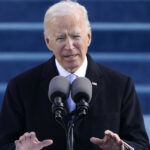What is the business of President Donald Trump of the United States with the ombudsman column and why is he featured here? A double-barrelled question. The answer is that the ombudsman column is about good writing. Good writing is about good and effective communication. This, in turn, is about the correct use of language – right words and phrases in their right places. Poor writing and ineffective communication are products of misused or misspelt words and misplaced phrases. If the writer cannot communicate effectively his job is not done.
I have repeatedly cautioned in this column that the English language is full of slippery slopes. It is as slippery for native speakers as it is for non-native speakers. Here is a good example of how slippery the English language is. Trump’s first language is English. He is not an Agila man to whom it is a second language and who has to frequently contend with the intrusion of Idoma language into English expressions in speaking and writing. You would expect Trump to speak and write perfect English; perhaps not the Queen’s English, because the Americans fought for their independence to be rid of the British royalty.
- Abia Warriors extend unbeaten run to four games
- PHOTOS: Life Returns To Normal In Community Where Zamfara Schoolgirls Were Abducted
Trump is the world’s twitter-in-chief. He is the only world leader who runs his government on twitter. He uses it to fire his aides; he uses it to make policy pronouncements and, what he enjoys most, he uses it to insult people – Americans and non-Americans alike. It was this latter use of the twitter that brought him his latest trouble with his fellow Americans.
This was what happened. In May, the president mounted his twitter pulpit and rained insults on former Vice-President Joe Biden, whom he was once wrongly called Bidan in his tweet, the Democratic party and Senator Mark Warner, a Democrat from Virginia. On Warner, the president wrote: “…their is nothing bipartisan about him.”
The guardian angels of the language and other Americans were horrified. And they rushed to their own twitter and other platforms to let the president know the damage he has done and continues to do to their precious language.
This piece is based largely on a piece on the incident and other Trump howlers by Sarah Lyall of the New York Times. Her interesting piece on the presidential gaffe was published in the New York Times of September 1. One of those who instantly rose to cry foul over Trump’s misuse of the word their was Bryan A. Garner, the author of Garner’s Modern English Usage and thus one of the puritans keeping a permanent vigil over the English language. You do not expect him to stomach such a wilful transgression of the language by a native speaker who should know better.
According to Lyall, the man felt “his blood pressure steadily rising” over the presidential clumsiness with the word, their when he meant to write there. Garner promptly expressed his shock in a twitter addressed to the president. He wrote: “You mean, there is nothing bipartisan about him. Not ‘their,’ which is the possessive form of ‘they.’ Wouldn’t it be worth $75,000 a year to pay for a presidential proof reader so that you will have the semblance of literacy?”
Garner told an interviewer: “If you care about literacy and the correct and accurate use of language, then this president has got to be driving you crazy, regardless of your political point of view.” He was not the only man whose blood pressure rose over Trump’s inability to be a linguistic role model. Several others joined in the fray and dug up a slew of Trump’s problems with the English language.
Jonathan Owen, a linguist and editor said, “…what I think bothers me most about Trump’s sloppiness is that it seems so deliberate.” Many of his critics believe that he is setting himself up as a poor role model for fellow Americans because he relishes his errors of spelling and syntax. Mary Norris, former copy editor of the New Yorker magazine said, “Trump thinks he can get away with stuff simply because he does it. But he is not the king of language. He’s not the king of anything.” Of course, we know that the Americans, like the Igbo, do not have a king.
If it is any consolation, Trump is not a lone linguistic offender in the White House. Former vice-president, Dan Quayle, and former President George W. Bush were also caught on the wrong side of their own language. Quayle had problems with the plural of potato. Bush gave us a new word: “misunderestimate.” Lexicographers promptly rejected it.
Trump is the only man who takes immense personal pride in doing unpresidential things to the embarrassment and the amusement of fellow Americans in equal measure. As Lyall put it, “Indeed, rather than being embarrassed, the president seems to be proud of his mistakes – or even to believe that because he has committed them, they are not mistakes at all.”
Indeed so. Trump’s response to his critics last year was: “After having written many best-selling books, and somewhat priding myself on my ability to write, it should be noted that the Fake News constantly likes to pour over my tweets looking for a mistake.”
Wahala. He wrote pour when he meant to write pore. And this from a best-selling author? The good thing is that the president’s fellow Americans were well aware that despite his stout claims of being a best-selling author, his English is not stellar. But they had hoped, according to Kory Stamper, a lexicographer quoted in the New York Times piece, that “After he won the election and his writing style came under scrutiny, people said that once he took office, he would rise to the occasion. But you can see that some of the things he does have gotten worse, like the rampant capitalisation of weird words. Trump seems to flout everything, so we’d like him at least to have a basic grasp of English composition.”
Do you still wonder how a man who does not appear to have “a basic grasp of English composition” became the author of many best-selling books? This is America.
I had initially thought that the president has problems with his spelling, as indeed, many us do. I had also thought that what led Trump astray was a delicious quirk in the English language in which words spelt differently and with different meanings have the same or similar sound: note his use of pour for pore; principal for principle.
The technical term for this group of words was homonyms. It is now better known as homophones, a term favoured by the Americans. Most of us silently pronounce words in our heads as we read or write. Homophones pop in – and quite often drop on the word processing screen before we catch them.
Here are some homophones that may or may not be that strange to you but which lurk in the corner each time you see your fingers walking on the keyboard: allowed – aloud; stair-stare; scene – seen; role-roll; peak-peek; peace-piece; plain-plane; dear-deer; flea-flee; foul-fowl; hole-whole; bee-be; brake-break; ate-eight; soul-sole; tail-tale; whether-weather; no-know; sale-sail; hear-here; tee-tea; dew-do; heel-heal; weep-whip; flew-flu; right-write; pain-pane; sum-some;
male – mail.
As I was completing this piece, I came across a tweet by the avuncular Senator Dino Melaye on the correct use of English. Dino is a greater lover of this social medium. In the tweet, he drew attention to what he described as “some popular grammatical blunders everyone has made at least two times.” Here they are (italics mine):
1. You are taking it personal (wrong)
You are taking it personally (correct)
2. He is matured (wrong)
He is mature (correct)
He has matured (correct)
I am sure Senator Melaye is not adding English language lecture series to his heavy burden of making laws for the good governance of our dear country. I am intrigued that correct English matters to him. Funny. One politician is mangling English; the other wants us, to borrow from Edwin Newman, to keep a civil tongue.
(First published September 29, 2019)

 Join Daily Trust WhatsApp Community For Quick Access To News and Happenings Around You.
Join Daily Trust WhatsApp Community For Quick Access To News and Happenings Around You.


